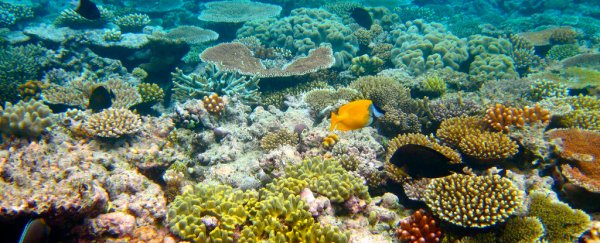On Sunday, Prime Minister Malcolm Turnbull announced that Australia would be putting aside more than $500 million Australian dollars (or $379 million USD) to protect the Great Barrier Reef.
The amount is unprecedented, and is the biggest single investment that the imperilled ecosystem, or any other coral reef ecosystem, has ever seen.
As part of the initiative, the Australian government will be entrusting $444 million of the pledge to the Great Barrier Reef Foundation, a national non-profit which aims to "keep the Barrier Reef Great."
The Foundation will use the money to counter water pollution, combat coral-eating starfish, increase public awareness, boost reef monitoring, and improve the environmental impact of surrounding businesses.
The funds will also be used to expand reef restoration efforts, including trialling new techniques that can breed corals resistant to high temperatures and light stress.
"There is no doubt that our great living treasure is under enormous threat from climate change and we must all work together to do everything possible to achieve the Paris Agreement," said Dr. John Schubert, Chairman of the Great Barrier Reef Foundation, in a statement.
"But while the world works to tackle climate change on a global scale, there are many things we can and must do to build the resilience of the Great Barrier Reef right now."
It's no secret that The Great Barrier Reef, one of the seven natural wonders of the world, is in imminent danger – and humans are primarily to blame.
The Great Barrier Reef is home to the world's largest collection of coral reefs, with about 400 types of coral and 1,500 species of fish. Now, its future is uncertain.
Between 1985 and 2012, human influences have resulted in a 50 percent decline in coral cover. As a consequence of burning fossil fuels, climate change has led to coral bleaching and ocean acidification, while coastal development and fishing have encroached upon these previously untouched habitats.
A 2016 survey revealed that 93 percent of the Great Barrier Reef has already been damaged by coral bleaching.
However, Australia's environment and energy minister, Josh Frydenberg, is confident that "the right plan and the right investment" will help secure what he describes as a "remarkably resistant" reef.
"The more we understand about the reef, the better we can protect it," Frydenberg told the Australian Broadcasting Corporation (ABC).
"Millions of dollars will go into science and to better data management and to be able to test the impacts on the reef," he added.
Some environmentalists are not so sure. They argue that the money does not address the underlying issue, and that the Australian government has not done enough to cut carbon emissions.
Kelly O'Shanassy, CEO of the Australian Conservation Foundation, pointed this out in a recent tweet.
Our elected representatives can not protect the Great Barrier Reef while supporting coal which fuels global warming & is killing our reef. We need real action to ditch coal & shift to clean energy
— Kelly O'Shanassy (@kellyoshanassy) April 29, 2018
Others expressed similar sentiments.
This is The Big Lie.
— David Ritter (@David_Ritter) April 29, 2018
You cannot ‘preserve’ the Great Barrier Reef without cutting carbon emissions.
That means no new coal, oil and gas. Turnbull knows this. They all know it. But they prefer to repeat The Big Lie.https://t.co/p3cekvOy1y #coaltruth https://t.co/TIg5PbDdhE
Bill McKibben, an environmentalist and founder of 350.org, has been particularly critical of the Turnbull government's continued reliance on coal.
"Science is well aware of what is killing coral on the Great Barrier Reef — it's the excess heat that comes from burning fossil fuels," he told The New York Times.
"If the Turnbull government was serious about saving the reef, they would be willing to take on the industry responsible for the damage."
McKibben finds the announcement somewhat hypocritical given the Turnbull government's support of the controversial Adani coal mine, which would have a deleterious effect on the reef.
"To simultaneously promote Adani's coal mine, which would be one of the world's largest, pretending to care about the world's largest Reef is an acrobatic feat only cynical politicians would attempt," added McKibben.
